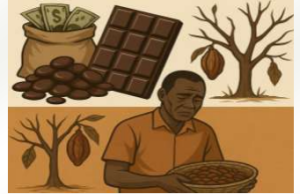Global Chocolate Industry Boom Amidst Africa’s Cocoa Crisis

Chocolate, a product loved and consumed across the world, is deeply rooted in the labour and livelihoods of millions of smallholder farmers, particularly in West Africa.
The PAMA Manufacturing Global News Bulletin, June 2025, highlighted that as of 2024, the global chocolate industry remains one of the most profitable and dynamic segments of the food and confectionery market, valued at over US$130 billion and projected to reach US$172.89 billion by 2030.
However, the industry has recently witnessed an unprecedented surge in prices, with cocoa costs rising by over 300% and reaching a record high of US$12,500 per tonne in April 2025, according to data from the New York and London markets.
It stated that the price surge is largely driven by significant shortages in the global cocoa supply, adding “As a result, retail chocolate prices have climbed by 15% to 25% in key consumer markets such as the United States, Germany, and the United Kingdom. Seasonal confections like Easter eggs and Valentine’s chocolates have become notably more expensive.”
Currently Ivory Coast is in the epicentre of the crisis, because Ivory Coast (Côte d’Ivoire) is the world’s leading cocoa producer, accounting for nearly 40% of global cocoa bean output, making it the single most important supplier to the $130 billion global chocolate industry.
The cocoa crop reportedly is the lifeline of Ivory Coast’s economy, accounting for around 15% of its GDP and employing more than 5 million people in 2024–2025, is currently faced with an existential threat.
According to the bulletin, “ in recent months, cocoa production in Ivory Coast has plummeted due to erratic weather patterns, pest and disease outbreaks (Cocoa Swollen Shoot Virus Disease) leading to an output dropped from a typical 2.3 million tonnes to approximately 1.75–1.8 million tonnes, according to data from the International Cocoa Organization (ICCO) with as much as 20–30% of plantations now infected with Cocoa Swollen Shoot Virus Disease (CSSVD), with no short-term cure in sight.
“Again, in an unexpected move, is the proposed 21% tariff on Ivorian cocoa products by the United States Trade Representative (USTR), citing allegations of child labour and lack of transparency in Ivory Coast supply chains. Although enforcement has been temporarily suspended for 90 days (as of April 2025), pending further negotiation.”
It declared that this trend portends the larger danger for Africa since the Ivory Coast crisis is not isolated, but exposes the deep vulnerabilities of African economies over-reliant on raw commodity exports.
Consequently, Ghana, Nigeria, and Cameroon, also major cocoa producers, face similar climate, disease, and price volatility risks.
It emphasized that the lack of domestic processing leaves African nations at the mercy of global markets, losing out on the value-added stages of the chocolate industry, which generate over 90% of the sector’s profits abroad, where processing, branding, and distribution take place.
Additionally, this overdependence model stifles job creation, traps farmers in poverty, and leaves African economies vulnerable to external shocks, whether from climate, market volatility, or global trade politics.
The implication for Ivory Coast, other African economies and the global chocolate industry it noted are enormous as the cocoa supply crisis in Ivory Coast signals deeper structural vulnerabilities in Africa’s rural economies, while Ghana, Nigeria, Cameroon, and other major producers face similar risks, with rural livelihoods increasingly exposed to climate shocks, disease outbreaks, market volatility, and trade politics.
“The crisis has already driven global cocoa prices up over 300%, squeezing margins for manufacturers and pushing up retail prices worldwide. Farmers in Africa, however, remain trapped in low farmgate prices (e.g., 1,500 CFA francs / about $2.50/kg in 2024), unable to cover rising production costs.
“The risk of punitive trade measures (e.g., proposed 21% U.S. tariff on Ivorian cocoa products) could further erode demand and incomes, deepen rural poverty and weaken social stability.
“Without decisive action, these shocks could undermine Africa’s global trade position and perpetuate its role as a raw commodity exporter, missing the industrialisation opportunity that cocoa presents,” PAMA bulletin stressed.
It pointed out that the lessons for African countries and the way forward is to strengthen the cocoa production base by investing in climate-smart and disease-resistant cocoa farming, including largescale seedling distribution, agroforestry, and integrated pest management.
It harped on the need to reform farmgate pricing frameworks so farmers earn a fairer share of global cocoa wealth, enabling reinvestment in farms and communities.
It advocated for scale up replanting with improved varieties and launch continent-wide programmes to replace ageing, diseased plantations with high-yielding, disease-resistant, and climate-resilient seedlings.
Other replanting strategies, it noted is to create regional seedling and nursery centres under ECOWAS, ECCAS, and AfCFTA industrial corridors, then prioritise cocoa processing and value addition by adopting national and regional industrial policies that promote local cocoa processing — from semi-finished inputs (butter, liquor) to finished goods (chocolate, cosmetics).
It cited other strategies to include providing fiscal incentives (tax breaks, concessional loans, PPP support) to attract investment into processing infrastructure and SME chocolate makers by Integrating cocoa into AfCFTA industrialisation strategies, enabling regional value chains and intra-African trade in processed cocoa products.
The bulletin mentioned foster research, innovation, and branding fund, R&D on value-added cocoa uses (e.g., health foods, beverages, cosmetics), then to create and promote African chocolate and cocoa brands that command premium prices in global markets.
It acknowledged the need to mobilise development finance and partnerships, urging multilateral institutions and development partners to shift from supporting commodity extraction toward financing Africa’s industrial and value-added transformation; leverage sovereign funds, regional banks, and international investors to scale processing and manufacturing capacity.
It affirmed that Africa must deepen its cocoa production and own the chocolate economy, adding “the governments, manufacturers, and relevant stakeholders must work together to build resilient, diversified, and industrialised cocoa economies that deliver jobs, prosperity, and sustainable growth.”
